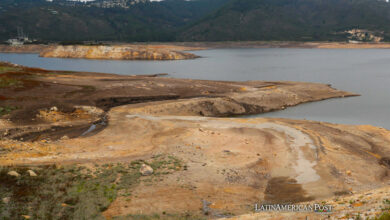Opinion: Veganism as an ethical and political act
In the midst of a health crisis and the imminent threat of climate change, veganism is a more ethical and political option than a nutritional one .

Is veganism a type of diet or is it really an ethical and political act? Photo: Pixabay
LatinAmerican Post | Vanesa López Romero
Listen to this article
Leer en español: Opinión: El veganismo como acto ético y político
Veganism is often seen as an "extreme" diet and it is believed that those who decide to adopt this type of nutrition are fanatics and have a very different lifestyle than any ordinary person. But it is worth asking, is veganism a type of diet or is it really an ethical and political act?
The word "vegan" was created by Donald Watson, a British man born in 1910 who grew up in a mining town where eating meat and animal products was more than normal. However, as he recounted in a 2002 interview for Foods magazine, as a child he saw one of the pigs on his uncle's farm, where he usually went on vacation, was killed. It was then that he began to wonder why no one around him spoke about the duties that we as human beings have with animals, which are also living beings, and only acted based on the rights that we believe we have over them. In 1924, at the age of fourteen, he decided to become a vegetarian and, after years of conversations with friends, experts and acquaintances, in 1944 he founded the Vegan Society in order to clearly differentiate the vegetarian from the vegan diet.
For Watson "veganism is a philosophy of life that excludes all forms of exploitation and cruelty towards the animal kingdom and includes a reverence for life. In practice, it is applied following a purely vegetarian diet and encourages the use of alternatives for all materials derived partially or totally from animals ". Likewise, Watson compared animal exploitation to human exploitation, referring specifically to slavery. In this way, he proposed an ethical look at the production and normalized consumption of animals and their derivatives.
Also read: Deforestation: a constant threat to Latin America
Since then, veganism has been coming together with other visions of life and even social movements, which has allowed it to be nurtured by different natures. But it has maintained its main motivation: an antispeciest and sentiocentic vision (this is an ethical approach that affirms moral consideration and respect for all beings with the capacity to feel) that seeks to protect the interests of animals in general. This means that not only a plant-based diet is proposed, but it also aims to bring this mentality to consumption in general beyond food: not to wear clothes that have animal tissues; do not consume beauty products, cleaning products, etc. that are tested on animals; not attend events or shows where animal life is exploited, such as circuses or zoos.
Thus, those who acquire a vegan lifestyle are establishing an ethical and political position based on responsible consumption habits with the animal kingdom. This has to do directly with environmental care, since it has been shown that the livestock, egg and milk industries contribute to pollution and global warming. According to the Food and Agriculture Organization of the United Nations (FAO), "The livestock sector generates more greenhouse gases – 18 percent, measured in its equivalent in carbon dioxide (CO2) – than the transport sector. It is also one of the main causes of degradation of soil and water resources. "
In this vein, veganism also has an impact on ecology. With the arrival of the pandemic, the UN affirmed that the per capita consumption of meat fell by 3% in 2020 compared to 2019. Although these data give a light of hope that the consumption of meat is less and less normalized it is necessary to think that, as long as governments and large industries do not take into account the need to start implementing measures that take into account animal life in an ethical and moral way, the so-called circular economy will not make sense.
Of course, there are hundreds of reasons from which it is seen as inconceivable to have a vegan diet in an entire country, starting with the economic downturn that would occur in the livestock, poultry, dairy sectors, and even in the fashion and beauty industries. But thinking about veganism from the political point of view also implies thinking that those resources that these industries use will cease to exist if it continues to be consumed in the way it has been done until now. In the long run, they are unsustainable markets on their own. Rethinking consumption individually, as vegetarianism does, does not make much sense in this vein; On the other hand, veganism includes an individual political action that in the long run has an impact on the community, in the countries and, thus, in the world in general.
Unfortunately, the fact that only a few people consume vegan is not going to make any changes at a macro level, so it is necessary that these ideas, no matter how "extreme" they may seem, are taken into account in large offices, in companies, industries and, above all, in the governments of countries that want to boost their economy from sustainability: it will not be truly sustainable until the world is thought of as the home of human beings, but also of sentient animals.




